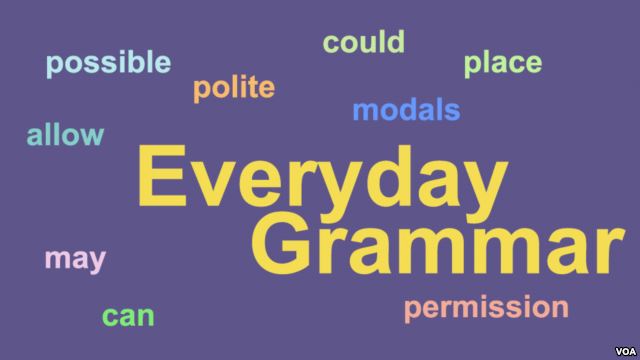VOA慢速英语:每日语法:can could may 的不同
This week we will give you some tips on how to usemodals to make requests and give permission. Somecommon modals for expressing permission are may, can, and could. But these modals have multiplemeanings that can be confusing for English learners.
Can and May
 |
Children in American schools learn to use the modalmay when asking for permission. A student might askthe teacher, "May I be excused?" before leaving the room. When studentsasked, "Can I leave the room?" their teachers often made a joke, "You can, butyou may not." The teacher was saying the student is able to leave the room, but does not have permission to do so. May is the most formal way to ask forpermission. The distinction between can and may is slowly disappearing inEnglish.
These days, is not always clear if may is being used to express permission or possibility—or both. Let's look at some examples in the language of Internetprivacy policies. When you visit a website for the first time, you often see apopup box asking for permission to collect information about you. Privacy lawsin some countries require websites to tell you what information is collectedand how it will be used. A common privacy statement includes this sentence: “We may collect various types of information…when you visit any of oursites.”
Let's see what this legal language really means. "We may collectinformation…" means that you give the company permission to collectinformation about you. In other words, you allow the company to save youremail address or your computer's address.
But may has multiple meanings. In addition to expressing permission, mayalso expresses possibility. For example, “It may rain” means that there is apossibility of rain.
Let’s go back to our privacy example. “We may collect various types ofinformation…when you visit any of our sites.” The policy contains some cleverlegal language. “We may collect information” means “We have permission tocollect information.” But it could also mean, “There is a possibility that we willcollect information.” One could make an argument for both meanings. As anInternet user, you should assume both meanings of may are part of the policy.
Could and May
A third modal for making polite requests is could. For example, “Could I pleasehave some water?” Could is the past tense of can. However, when asking forpermission, could does not have a past tense meaning. Could has the samemeaning as may when making requests. It is equally polite to say “Could Ileave early?” or “May I leave early?”
Could is used with any subject to ask for permission. For example “Could Iopen the window?” or “Could you open the window?” are both grammatical.
Be careful with may. When making a request using may, only I can be thesubject. If you are making a formal request to dance with someone, you wouldsay, “May I have this dance?” not “May you have this dance?” May followed byyou does not express a request; it expresses a wish, as in “May you livelong.”
But that’s another episode. Until next time, we’ll leave you a song ofpermission by the Temptations.
May I have this dance
May I, may, may I have this dance
I’m Jonathan Evans with Ashley Thompson.
Dr. Jill Robbins wrote this story for Learning English. Adam Brock was theeditor.
______________________________________________________________
Words in This Story
modal verb - a verb (such as can, could, shall, should, ought to, will, or would) that is usually used with another verb to express ideas such as possibility,necessity, and permission
permission- n. the right or ability to do something that is given by someonewho has the power to decide if it will be allowed or permitted
distinction – n. the separation of people or things into different groups
privacy – n. the state of being away from public attention
pop-up – adj. computers : appearing on the screen over another window ordocument
allow - v. to permit (something) : to regard or treat (something) as acceptable
formal- adj. of language: suitable for serious or official speech and writing
- 频道推荐
- |
- 全站推荐
- 推荐下载
- 网站推荐




















